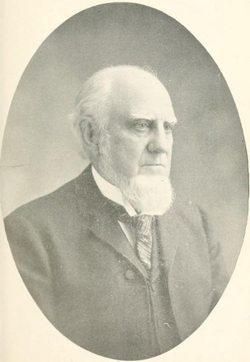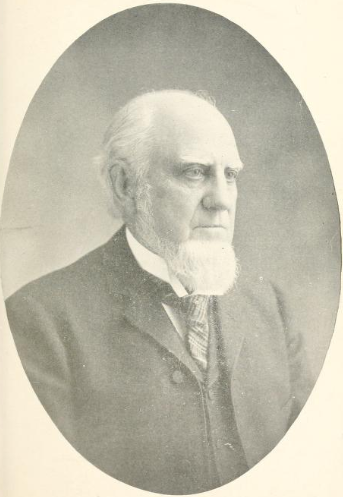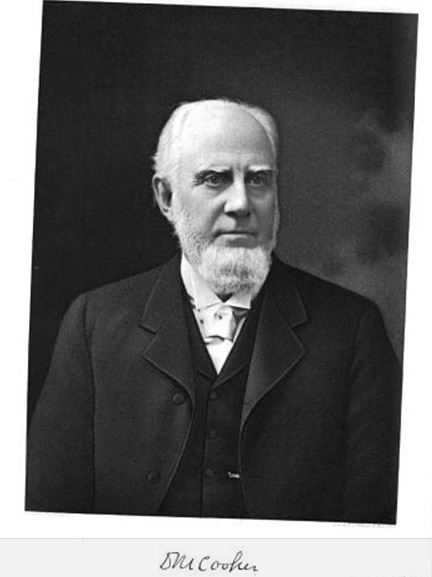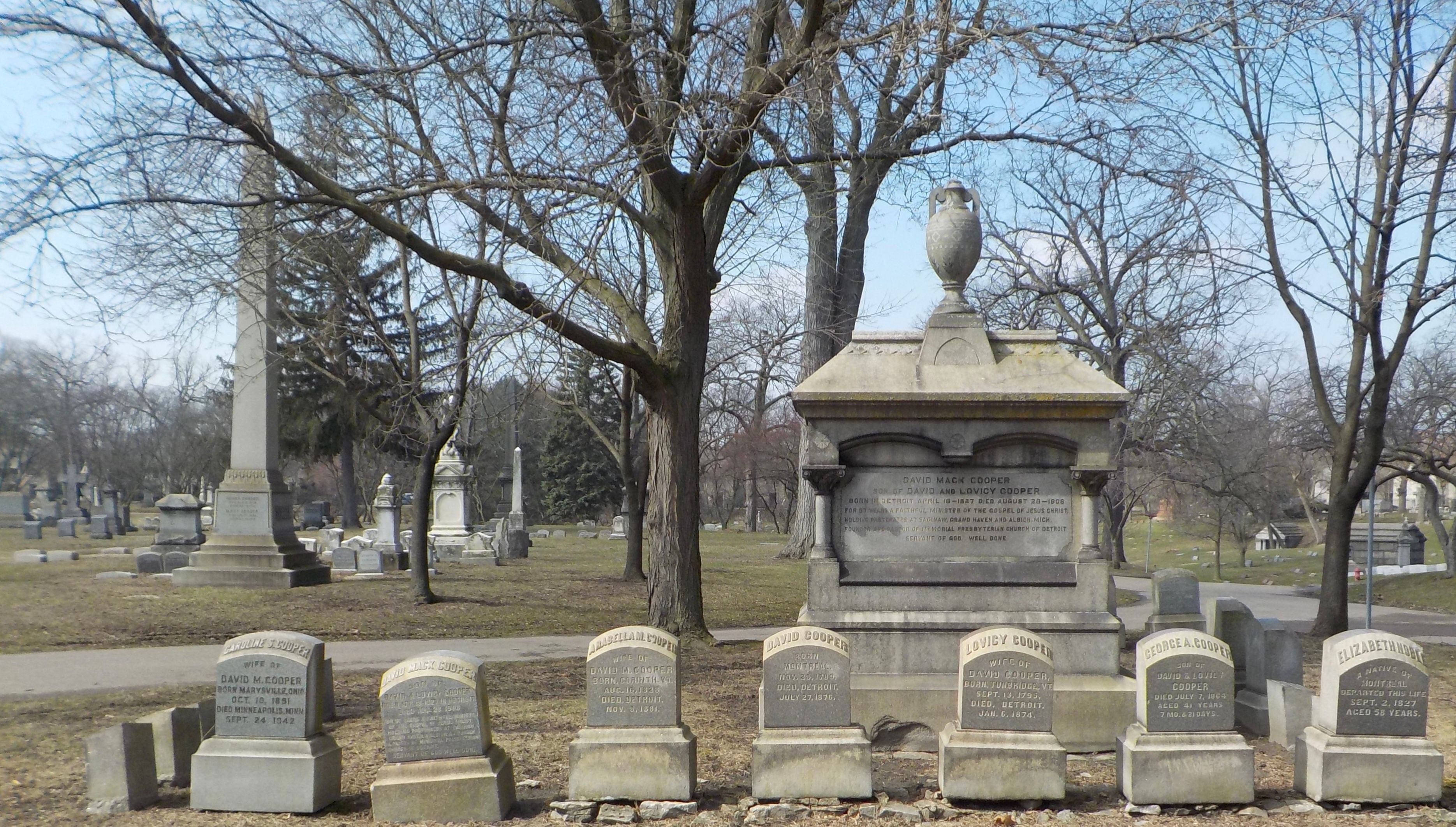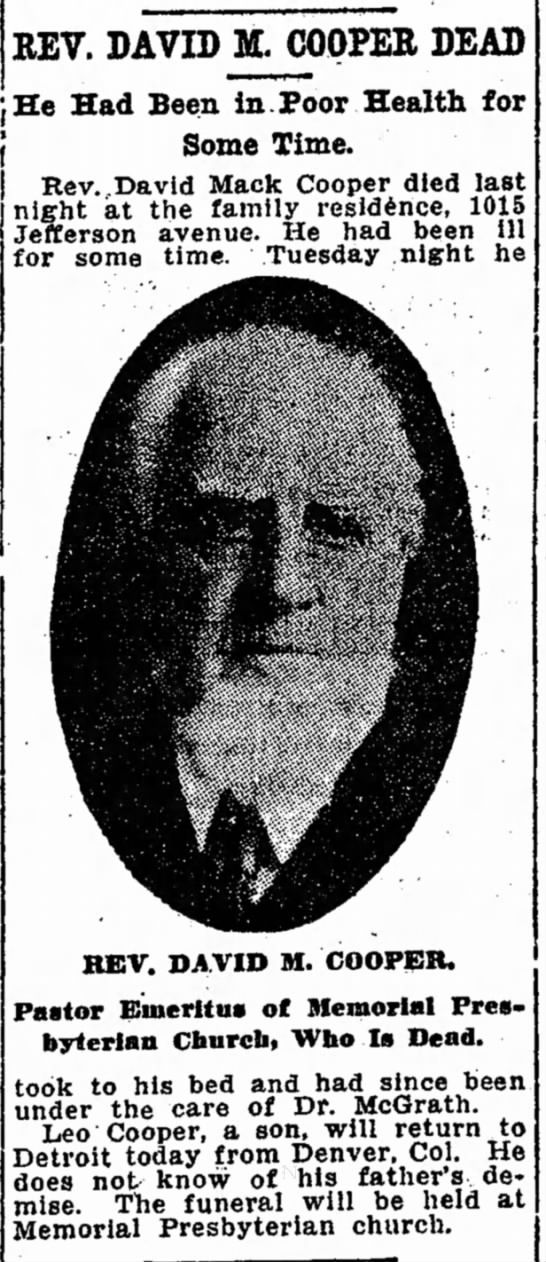He married (2nd), October 9, 1883, Carrie E. Skinner. She was born Oct. 10, 1851. She died 1942.
The following is taken from "Necrological Reports and Annual Proceedings of the Alumni Association of the Princeton Theological Seminary..., Volume 3"
"Son of David and Lovicy (Mack) Cooper, was born April 18, 1827, in Detroit, Mich. He made a public confession of his faith at the Congregational Church at Romeo, Mich., at the age of seventeen. His preparatory studies were pursued at Romeo under Prof. Rufus Nutting, and he graduated from the University of Michigan in 1848. He entered the Seminary at Princeton in the fall of the same year, remaining one year.
He completed his theological studies under the Rev. Dr. Geo. Duffield at Detroit under the care of the Detroit Presbytery. He was licensed by the Presbytery of Detroit Feb. 6, 1851, and ordained by the same Presbytery March 3, 1853. He was stated supply of the church at Saginaw City, Mich., from 1851 until installed its pastor at the time of his ordination, and was released from this charge April 27, 1859; he was then pastor of the church at Grand Haven, Mich., from Oct. 18, 1859, to June 7, 1864. He was stated supply of the church at Albion, Mich., from 1860 to 1874, and resided as an evangelist at Albion from 1875 to 1877.
The following year, he took up his residence in Detroit and continued to reside there until his death. He was pastor of the Memorial Church in Detroit, which he built at his own cost and served without salary as pastor from 1881 until 1896, when he was made pastor emeritus. He died Aug. 28, 1908, in Detroit, in the 82d year of his age. He was buried in Detroit. He received the degree of D.D. from Alma College in 1892. Dr. Cooper was a trustee of Alma College and moderator of the Synod of Michigan in 1867. He published a number of addresses and other pamphlets."
The following is from "Rev. David M. Cooper, present pastor of the Memorial Presbyterian church of Detroit...
The Rev. David M. Cooper was born in Detroit, April 18th, 1827. Upon reaching the proper age he was sent to the schools of Detroit, and after obtaining the necessary preliminary preparation, entered college, taking a literary course.
Mr. Cooper in early life decided upon the ministry as a profession, and after a year spent at Princeton Theological Seminary, New Jersey, prosecuted his studies under the supervision of the Rev. Dr. Duffield. He was licensed by the Detroit Presbytery about 1850, temporarily, and afterwards supplied the pulpit of Rev. Mr. Atterbury, at Flint. In 1851 he was induced to take charge of the missionary work in the Saginaw valley. ...
On Mr. Cooper's arrival at Saginaw he found that the membership consisted of but ten persons, of which number only three were males. He entered upon his work with some hesitation and had proceeded to prepare for the erection of a church edifice, when the excitement at East Saginaw drew away most of his congregation to that town. He still resolved to follow them with his ministrations and accordingly commenced holding afternoon service at East Saginaw, crossing the river in a canoe. With the exception of a Rev. Mr. Adderly, he was the first minister that preached in East Saginaw. The rapid growth of East Saginaw induced a corresponding increase of members to the church, and at the end of eighteen months, finding the labor of supplying the two churches too much for his strength, he turned over his East Saginaw work to the Rev. Wm. C. Smith, and also secured the services of the Rev. L. I. Root to organize the Presbyterian church at Bay City, then called Lower Saginaw.
Thus Mr. Cooper has the satisfaction of knowing that those two flourishing organizations sprang from the germ of the Saginaw City church planted by him. In 1859 he was compelled, on account of ill health, reluctantly to leave the valley, and after long and successful pastorates at Grand Haven and Albion took up his residence, upon the death of his father, in Detroit, the city of his birth, in the year 1878. Preferring to work out, rather than to rust out, he immediately erected, largely at his own expense, and in honor of his beloved parents, that tasteful structure known as the Memorial Presbyterian church, situated at the corner of Clinton and Joseph Campau avenues. The congregation that now statedly worship within its walls was gathered together by his own exertions. For the last ten years he has ministered to them as their chosen pastor, without compensation, and still continues to do so with all the ardor of early youth.
Referring to the Memorial church, it is but proper, in connection with a sketch of Mr. Cooper, to insert the following:
"The doors of the new Memorial church were thrown open at 2 o'clock Sunday afternoon, and in less than ten minutes each of the 425 sittings was occupied, while many people remained standing in the lobby and aisles, there being, it is estimated, over six hundred persons present. It was the first time that the new structure, complete even to holding an audience, was seen, and it is not too much to say that a more beautiful picture of such a character has never been seen in Detroit. The auditorium is a beauty, harmonizing in architectural design and ornamentation completely, having a series of eleven memorial windows, the larger one of which is in memory of the father, mother and wife of Rev. David M. Cooper, present pastor of the church. The remaining ten windows are historical memorials of the growth and progress of Presbyterianism."
At the close of the memoir, read by Mr. Cooper, of his father, mother and wife, for whom the church was erected as a memorial, he concludes as follows: "I know of no more suitable or better way to perpetuate their memory than to employ a portion of the fortune bequeathed us, in the erection of a house of worship wherein the Gospel of our Lord and Saviour Jesus Christ shall be freely preached by one who was in infancy baptized in the name of Father, Son and Holy Ghost."
Taken from: Chronography of notable events in the history of the Northwest territory and Wayne County. Complied and arranged by Fred Carlisle, 1890.
He married (2nd), October 9, 1883, Carrie E. Skinner. She was born Oct. 10, 1851. She died 1942.
The following is taken from "Necrological Reports and Annual Proceedings of the Alumni Association of the Princeton Theological Seminary..., Volume 3"
"Son of David and Lovicy (Mack) Cooper, was born April 18, 1827, in Detroit, Mich. He made a public confession of his faith at the Congregational Church at Romeo, Mich., at the age of seventeen. His preparatory studies were pursued at Romeo under Prof. Rufus Nutting, and he graduated from the University of Michigan in 1848. He entered the Seminary at Princeton in the fall of the same year, remaining one year.
He completed his theological studies under the Rev. Dr. Geo. Duffield at Detroit under the care of the Detroit Presbytery. He was licensed by the Presbytery of Detroit Feb. 6, 1851, and ordained by the same Presbytery March 3, 1853. He was stated supply of the church at Saginaw City, Mich., from 1851 until installed its pastor at the time of his ordination, and was released from this charge April 27, 1859; he was then pastor of the church at Grand Haven, Mich., from Oct. 18, 1859, to June 7, 1864. He was stated supply of the church at Albion, Mich., from 1860 to 1874, and resided as an evangelist at Albion from 1875 to 1877.
The following year, he took up his residence in Detroit and continued to reside there until his death. He was pastor of the Memorial Church in Detroit, which he built at his own cost and served without salary as pastor from 1881 until 1896, when he was made pastor emeritus. He died Aug. 28, 1908, in Detroit, in the 82d year of his age. He was buried in Detroit. He received the degree of D.D. from Alma College in 1892. Dr. Cooper was a trustee of Alma College and moderator of the Synod of Michigan in 1867. He published a number of addresses and other pamphlets."
The following is from "Rev. David M. Cooper, present pastor of the Memorial Presbyterian church of Detroit...
The Rev. David M. Cooper was born in Detroit, April 18th, 1827. Upon reaching the proper age he was sent to the schools of Detroit, and after obtaining the necessary preliminary preparation, entered college, taking a literary course.
Mr. Cooper in early life decided upon the ministry as a profession, and after a year spent at Princeton Theological Seminary, New Jersey, prosecuted his studies under the supervision of the Rev. Dr. Duffield. He was licensed by the Detroit Presbytery about 1850, temporarily, and afterwards supplied the pulpit of Rev. Mr. Atterbury, at Flint. In 1851 he was induced to take charge of the missionary work in the Saginaw valley. ...
On Mr. Cooper's arrival at Saginaw he found that the membership consisted of but ten persons, of which number only three were males. He entered upon his work with some hesitation and had proceeded to prepare for the erection of a church edifice, when the excitement at East Saginaw drew away most of his congregation to that town. He still resolved to follow them with his ministrations and accordingly commenced holding afternoon service at East Saginaw, crossing the river in a canoe. With the exception of a Rev. Mr. Adderly, he was the first minister that preached in East Saginaw. The rapid growth of East Saginaw induced a corresponding increase of members to the church, and at the end of eighteen months, finding the labor of supplying the two churches too much for his strength, he turned over his East Saginaw work to the Rev. Wm. C. Smith, and also secured the services of the Rev. L. I. Root to organize the Presbyterian church at Bay City, then called Lower Saginaw.
Thus Mr. Cooper has the satisfaction of knowing that those two flourishing organizations sprang from the germ of the Saginaw City church planted by him. In 1859 he was compelled, on account of ill health, reluctantly to leave the valley, and after long and successful pastorates at Grand Haven and Albion took up his residence, upon the death of his father, in Detroit, the city of his birth, in the year 1878. Preferring to work out, rather than to rust out, he immediately erected, largely at his own expense, and in honor of his beloved parents, that tasteful structure known as the Memorial Presbyterian church, situated at the corner of Clinton and Joseph Campau avenues. The congregation that now statedly worship within its walls was gathered together by his own exertions. For the last ten years he has ministered to them as their chosen pastor, without compensation, and still continues to do so with all the ardor of early youth.
Referring to the Memorial church, it is but proper, in connection with a sketch of Mr. Cooper, to insert the following:
"The doors of the new Memorial church were thrown open at 2 o'clock Sunday afternoon, and in less than ten minutes each of the 425 sittings was occupied, while many people remained standing in the lobby and aisles, there being, it is estimated, over six hundred persons present. It was the first time that the new structure, complete even to holding an audience, was seen, and it is not too much to say that a more beautiful picture of such a character has never been seen in Detroit. The auditorium is a beauty, harmonizing in architectural design and ornamentation completely, having a series of eleven memorial windows, the larger one of which is in memory of the father, mother and wife of Rev. David M. Cooper, present pastor of the church. The remaining ten windows are historical memorials of the growth and progress of Presbyterianism."
At the close of the memoir, read by Mr. Cooper, of his father, mother and wife, for whom the church was erected as a memorial, he concludes as follows: "I know of no more suitable or better way to perpetuate their memory than to employ a portion of the fortune bequeathed us, in the erection of a house of worship wherein the Gospel of our Lord and Saviour Jesus Christ shall be freely preached by one who was in infancy baptized in the name of Father, Son and Holy Ghost."
Taken from: Chronography of notable events in the history of the Northwest territory and Wayne County. Complied and arranged by Fred Carlisle, 1890.
Family Members
Sponsored by Ancestry
Advertisement
Explore more
Sponsored by Ancestry
Advertisement
